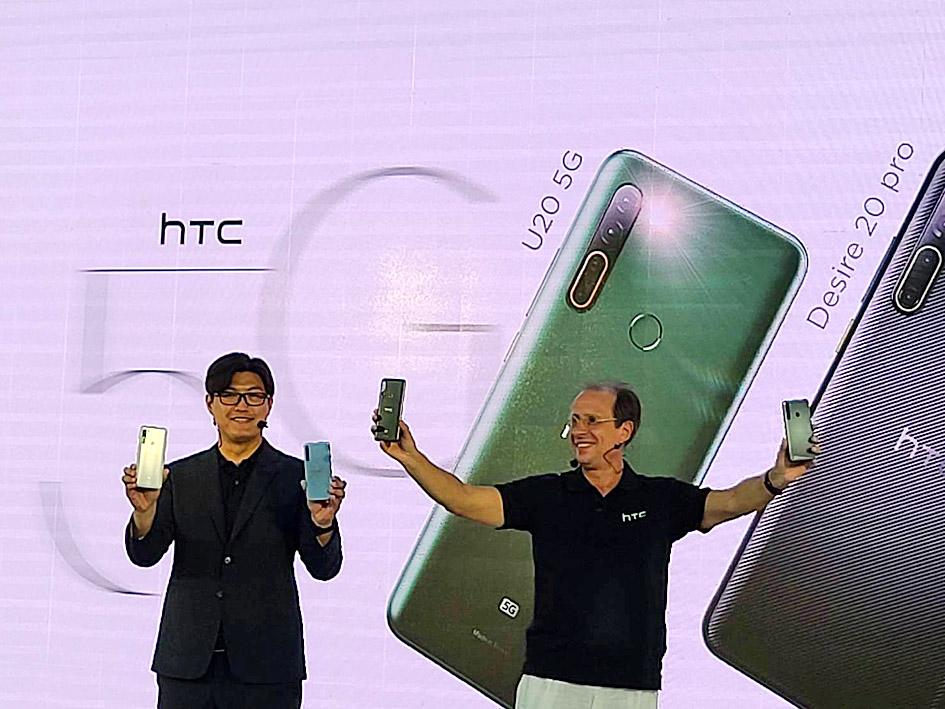HTC Corp (宏達電) yesterday unveiled the first made-in-Taiwan 5G smartphone and is to begin taking preorders on July 1.
The company last year released two mid-range smartphones — the HTC U19e and HTC Desire 19+ — as well as a second-generation blockchain mobile phone — the HTC Exodus 1S — which failed to help prop up its flagging sales.
The new HTC U20 5G, powered by Qualcomm Inc’s Snapdragon 765G processor and equipped with five camera lenses, is priced at NT$18,990.

Photo: CNA
While not the cheapest option on the market, the company’s new offering is still aimed at entry to mid-range consumers “who would like to try out 5G technology without breaking the bank,” HTC Taiwan president Darren Chen (陳柏諭) told a news conference at the company’s headquarters in New Taipei City.
The smartphone, which was assembled at HTC’s Taoyuan plant, is the “first made-in-Taiwan 5G smartphone in the world,” he added.
The handset is outfitted with a 6.8-inch full high-definition display and comes in two colors: green and white.

Photo: Wang Yi-hung, Taipei Times
It is expected to be ready to ship by August, Chen said, adding that certain certificates for the device are still awaited.
Seeking to first test the local market, HTC has yet to announce a release a date for the device in overseas markets.
“We are waiting to see how Taiwanese consumers react before expanding to a larger user base,” HTC chief executive officer Yves Maitre said, while hinting that he is looking to negotiate with some “familiar” European mobile phone carriers.
Prior to taking up his position at HTC late last year, Maitre served at French telecom Orange SA as executive vice president of consumer equipment and partnerships.
Maitre refrained from providing a sales target for the HTC U20 5G.
HTC also released an update to its Desire smartphone series, which was launched in 2010.
Priced at NT$8,990, the new HTC Desire 20 Pro is a more affordable option than the HTC U20 5G.
Powered by Qualcomm’s Snapdragon 665 processor, the HTC Desire 20 Pro is equipped with a 6.5-inch full high-definition screen and is also outfitted with five camera lenses.
The smartphone, which is not assembled in Taiwan, would be ready to ship tomorrow, the company said.

To many, Tatu City on the outskirts of Nairobi looks like a success. The first city entirely built by a private company to be operational in east Africa, with about 25,000 people living and working there, it accounts for about two-thirds of all foreign investment in Kenya. Its low-tax status has attracted more than 100 businesses including Heineken, coffee brand Dormans, and the biggest call-center and cold-chain transport firms in the region. However, to some local politicians, Tatu City has looked more like a target for extortion. A parade of governors have demanded land worth millions of dollars in exchange

An Indonesian animated movie is smashing regional box office records and could be set for wider success as it prepares to open beyond the Southeast Asian archipelago’s silver screens. Jumbo — a film based on the adventures of main character, Don, a large orphaned Indonesian boy facing bullying at school — last month became the highest-grossing Southeast Asian animated film, raking in more than US$8 million. Released at the end of March to coincide with the Eid holidays after the Islamic fasting month of Ramadan, the movie has hit 8 million ticket sales, the third-highest in Indonesian cinema history, Film

Taiwan Semiconductor Manufacturing Co’s (TSMC, 台積電) revenue jumped 48 percent last month, underscoring how electronics firms scrambled to acquire essential components before global tariffs took effect. The main chipmaker for Apple Inc and Nvidia Corp reported monthly sales of NT$349.6 billion (US$11.6 billion). That compares with the average analysts’ estimate for a 38 percent rise in second-quarter revenue. US President Donald Trump’s trade war is prompting economists to retool GDP forecasts worldwide, casting doubt over the outlook for everything from iPhone demand to computing and datacenter construction. However, TSMC — a barometer for global tech spending given its central role in the

Alchip Technologies Ltd (世芯), an application-specific integrated circuit (ASIC) designer specializing in server chips, expects revenue to decline this year due to sagging demand for 5-nanometer artificial intelligence (AI) chips from a North America-based major customer, a company executive said yesterday. That would be the first contraction in revenue for Alchip as it has been enjoying strong revenue growth over the past few years, benefiting from cloud-service providers’ moves to reduce dependence on Nvidia Corp’s expensive AI chips by building their own AI accelerator by outsourcing chip design. The 5-nanometer chip was supposed to be a new growth engine as the lifecycle